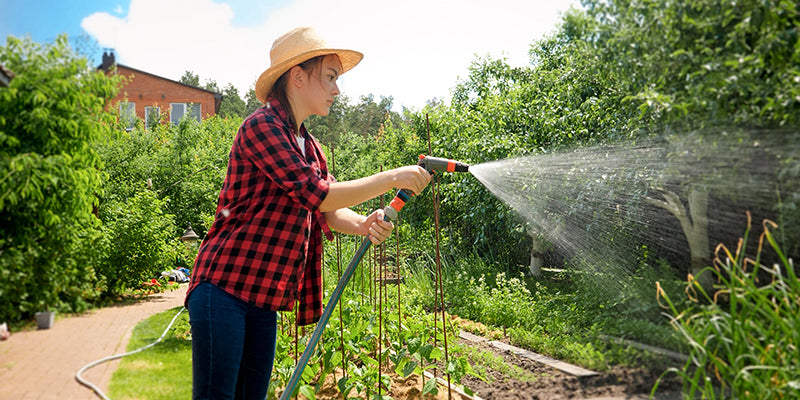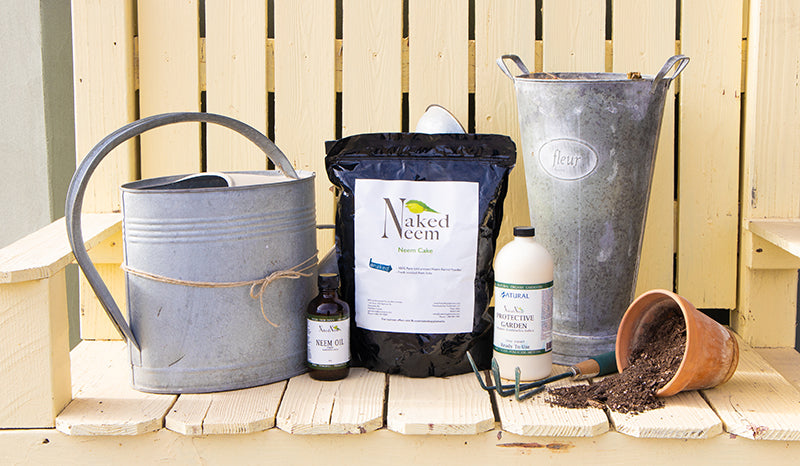Neem oil, derived from the neem tree, is a versatile and eco-friendly solution for gardeners seeking to nurture their plants while maintaining a natural balance. This guide explores the many benefits of neem oil, including its ability to combat fungal diseases like powdery mildew.
We also explore how neem can assist with eliminating pests such as spider mites and provide general pest control. Learn how to mix neem oil with water and soap for effective treatment, promoting the health and vitality of your garden's trees and shrubs.
The Benefits of Gardening With Neem Oil
Cold-pressed Neem oil comes from the neem tree and offers numerous insecticidal property benefits for gardening. It acts as a natural insecticide, fungicide, and bactericide, effectively controlling pests and diseases while promoting plant health.
This is possible because of the active ingredient called azadirachta. Neem oil is safe for humans, pets, and beneficial insects like bees and butterflies. This oil breaks down quickly, leaving no harmful residue, and is ideal for organic gardening.
Its many uses make it a valuable tool for preventive care and addressing existing issues in the garden. With neem oil, gardeners can maintain healthy and thriving plants while minimizing environmental impact.
How Much Neem Oil Should You Use When Gardening?
Following the guidelines below will help maximize neem oil's benefits while keeping your garden healthy and thriving.
Hand Held Neem Oil Sprayer Instructions
Below is how to use neem oil with a hose-end sprayer for your gardening needs; follow these straightforward instructions and maintain the correct neem oil ratio to water.

- Prepare the oil solution by mixing it in a separate container. Add approximately 2.5 tablespoons of neem oil and half a teaspoon of non-toxic liquid soap for every gallon of water. Mix the solution thoroughly to ensure the oil is properly emulsified.
- Before spraying: shake the sprayer well to ensure the oil solution is evenly mixed with water.
- When spraying: focus on both the tops and undersides of leaves where pests may reside. Ensure thorough coverage, but avoid excessive runoff.
- Continue spraying: until all plants are coated with the solution.
- After spraying: clean the sprayer thoroughly with water to prevent any residue from clogging the nozzle or components.
- Store: any remaining oil solution in a cool, dark place away from direct sunlight, as exposure to light and heat can degrade its effectiveness over time.
Neem Oil Hose End Sprayer Instructions
To use a hose-end sprayer with neem oil for your garden, follow these simple instructions:
- Mix neem oil solution: Combine 2.5 tablespoons neem oil, 2 cups warm water, and ½ teaspoon non-toxic liquid soap per 2.5 tablespoons oil. Blend or vigorously mix to emulsify.
- Determine sprayer setting: Calculate the desired concentration (e.g., 2.5 tablespoons of neem oil per gallon of water) and adjust the sprayer setting accordingly.
- Fill sprayer: Add neem oil solution (and optional liquid fish/seaweed fertilizer) to the hose-end sprayer and attach securely.
- Shake well: Thoroughly mix the solution in the sprayer.
- Spray plants: Apply solution evenly to the tops and undersides of leaves and surrounding soil.
- Use promptly & clean: Use mixture within 8 hours. Clean the sprayer immediately after use to prevent clogging.
How Often Should You Spray With Neem Oil?
How often you spray with neem oil depends on your garden's needs. For preventive care, spray every 1-2 weeks, especially when pests or diseases are a concern. Once the problem season approaches for your plants, like when bugs are more active, you might spray more often.

After that, you can spray every 2-4 weeks to keep things under control. If you're targeting a specific pest, you might need to spray every 3 days for about 2 weeks, which is usually how long it takes to break their life cycle. JMonitor your plants once every 24 hours and adjust your spraying schedule as needed.
Safety Warning For Spraying With Neem
When spraying with neem oil, it's important to be safe. This oil is safe for humans and pets, but it can irritate your eyes, skin, and stomach if you swallow it or get too much on your skin. Neem is dangerous for bees and other beneficial insects if they get sprayed directly. So, try not to spray when they're active, like in the middle of the day.
You will know if your neem oil mixture is not diluted enough because leaf burn, leaf spot, or black spot may appear. Not to worry. Wash your plants with the neem oil to reduce the concentration. The next time you spray, reduce the amount of neem.
Also, don't spray too close to waterways because neem oil can harm aquatic animals. Overall, be careful and follow the instructions on the label to stay safe while using neem oil in your garden.
Pair With Neem Cake Fertilizer
Applying neem oil spray with Zatural Neem Cake Fertilizer can provide additional benefits for your garden. Neem cake is made from leftover seeds after neem oil extraction. It acts as a natural bio-fertilizer, enriching the soil with nutrients and improving fertility.
When used together, neem spray helps control pests and diseases on the plants, while neem cake nourishes the soil and promotes healthy plant growth.
This combination creates a synergistic effect, enhancing your garden ecosystem's overall health and resilience. Plus, it's an eco-friendly approach that supports sustainable gardening practices.
Sum It Up!
In conclusion, incorporating neem oil into your garden care routine offers a natural and effective pest and disease control solution. With the simple instructions for using a hose-end sprayer, you can easily make neem oil work for your garden. By protecting your plants and promoting their health and vitality.
Remember to follow safety precautions and adjust application frequency to suit your garden's needs. By embracing the benefits of neem oil and pairing it with neem cake fertilizer, you can cultivate a thriving garden free from pests.
If you would rather not mix your own Neem Garden Spray, try Zatural's pre-mixed Neem Garden Spray.
For educational purposes only
*FDA DISCLAIMER -These statements have not been evaluated by the FDA.



